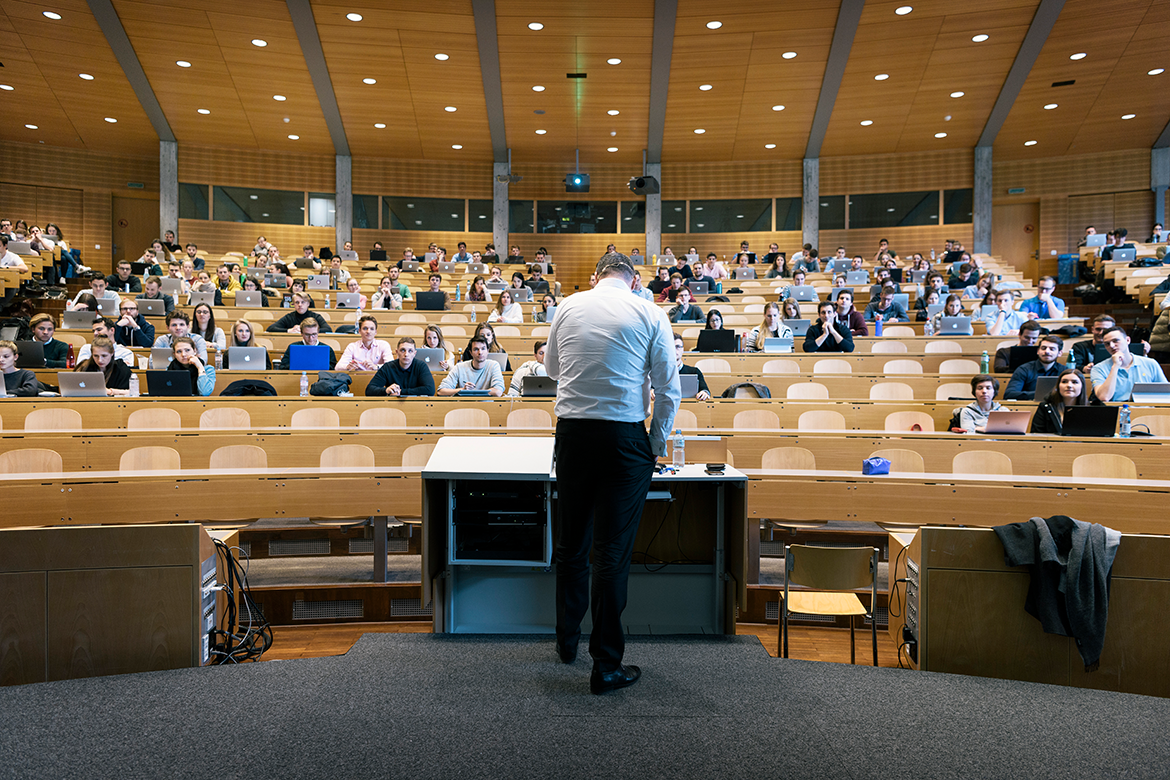UNIVERSITY TEACHING
“Lecturing should not be a burden”
Passing on knowledge is one of the basic missions of a university, but it is still less valued than research. In Geneva and Zurich, institutions are working to give it more weight.

Just getting students enthusiastic won’t win you many laurels. But the stars of research aren’t necessarily great pedagogues. So teaching at universities remains a poor relation. | Image: Christian Beutler/Keystone
“We need to stop describing university teaching as a burden”. In a column published earlier this year on the website of the science journal Nature, Peter Copeland, a professor of Earth and atmospheric sciences at the University of Houston, USA, calls for universities to place more value on teaching activities. “Excellence in research is expected, but the bar for teaching is lower, and the link between the two activities is often weak”, he writes.
The same is true in Switzerland. “It’s above all research that counts”, says Guido Gefter. He is the Japanese language specialist who in 2021 was awarded the University of Zurich’s Credit Suisse Prize for the best teaching, an internal award given by the student body and worth CHF 10,000. “In so much as universities see themselves primarily as places of research, then this imbalance is quite understandable”, says Gefter. “Most of the time, however, research and teaching are clumped together as the mainstays of the job description. That said, scientific careers can only be built on research work. Teaching is effectively irrelevant”.
Gefter describes his own teaching method as “traditional”, or even, as he ironically puts it, “unprofessional”. Chalk and blackboards are his two favourite tools. But he loves to share his knowledge. He likes to talk to his students and answer their questions. Perhaps that is what makes him so appreciated. “I can understand why teaching is seen as a burden”, he says. “Young people who want to have an academic career have to concentrate on publishing articles, because that’s what they are judged on”. Teaching skills are difficult to assess. “It’s easier to measure research performance using impact factors”.
Teaching feeds research
Gefter started out in Biel, and did not become a good teacher by chance. He has completed a Certificate of Advanced Studies in language teaching and continues to improve his skills at teaching weekends. Such a commitment “is not common”, he says. No pedagogical training is required for university professors in Switzerland. Surprisingly, Gefter is not in favour of changing this. “If there is no interest in teaching, I don’t think courses will help”, he says. There may, however, be an interest in interacting with a class: “Students raise questions that we haven’t necessarily thought of. It brings up the same problems again and again, forcing us to find out why”.
What can be done to capitalise upon educational tasks? At the other end of Switzerland, the same question is being asked by Micheline Louis-Courvoisier, the vice-rector in charge of this field at the University of Geneva. “Ideally, teaching should not be a burden”, she says, listing the measures adopted by her institution: consideration of teaching qualities in appointments, trial lectures, webinars, a dedicated teaching portal, etc. Assistant professors and young scientists are in general also subject to lesser teaching requirements in order to develop their research programme.
The problem is not new. Twenty years ago, it was already being discussed. Without commenting on other schools, Louis-Courvoisier believes that in Geneva, teaching now enjoys a fresh coat of polish. “In particular it’s since we started regularly carrying out evaluations by students”, she says. “They form part of the extension considerations. The idea is not necessarily to pit research against teaching, but to have indicators that allow us to evaluate and support our teachers in both disciplines”. Trial lectures are useful too. “They allow us to assess teachers’ intelligibility and enthusiasm”.
Another solution is the creation of permanent teaching posts. This is supported by Baptiste Hildebrand, who teaches the basics of physics to first-semester students in the natural sciences at the University of Fribourg. Like Gefter, Hildebrand was a laureate of the Credit Suisse prize for best teaching last year. Also like Gefter, he is not a professor, but a lecturer. He is able to leave research behind and concentrate on his teaching, to his great delight. “This position was created when I was finishing my post-doc”, he says, explaining how at the time he was planning to become a teacher in secondary school. “This type of position is quite new for us, at least in the hard sciences. It allows us to promote quality teaching”.
Frustrated students
The quality of teaching is a question that often comes up informally among students, says Hannah Wonta, the Secretary General of the Federation of Student Associations at the University of Lausanne. “The ‘star’ professors put forward by the institution do not necessarily have the pedagogical skills to match”, she says. “This can breed frustration among students who are there to learn”. In Wonta’s view, lecturers or similar positions are particularly useful for ab initio curricula, i.e., the basic lessons given at the beginning of a university course: “There is a gulf between secondary and higher education. Personally, I was a bit lost when I came to university. It’s essential to have good teachers at that point”.
No posts dedicated solely to teaching have been created at the University of Geneva, says Louis-Courvoisier. “I find it difficult to separate this activity from research, as together they form a wide virtuous circle”. The same is true at ETH Zurich. According to its press office: “Research and teaching are always thought of together, i.e., the courses are in principle offered by the researchers. Where necessary, this is supplemented by assigning teaching mandates to external specialists. This ensures that the teaching is always at the cutting edge of research”.
ETH Zurich points out that female doctoral students are involved in teaching and that commitment in this area “is part of the career promotion of the academic middle ranks”. In addition, a tool for “quantifying teaching” is being developed, “which should help to improve the organisation of all the available resources” in this area.
What’s the point of the prizes? Credit Suisse has been awarding them since 2006 as part of its outreach activities, with the aim of making “an important contribution to the quality of university and scientific education”, according to its website. Since they were awarded the prize, Gefter and Hildebrand have received more attention. Otherwise, both are sceptical about the significance of the awards. Hildebrand says he is “uncomfortable with awards in general”. Gefter doubts that it inspires anyone. Although he is grateful for being honoured, he is sorry for his colleagues who put equal effort into their classes without receiving such recognition. “But without it, there’d be nothing”.




